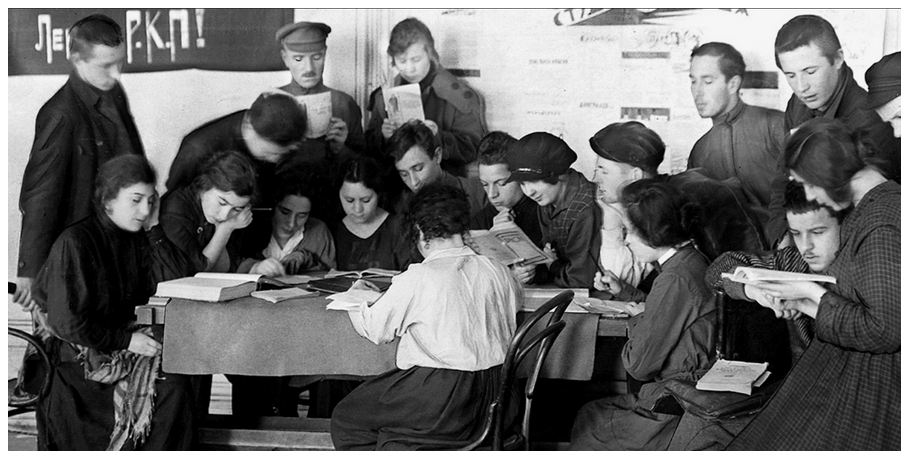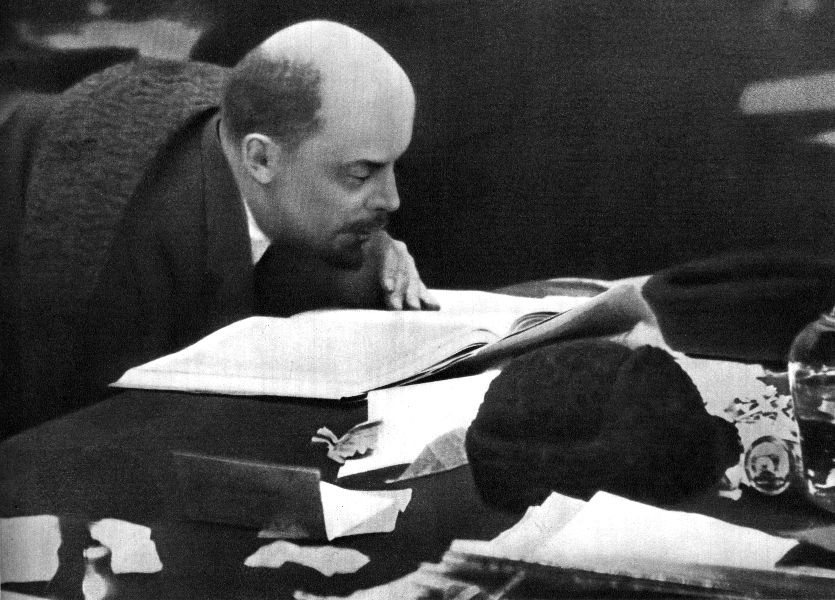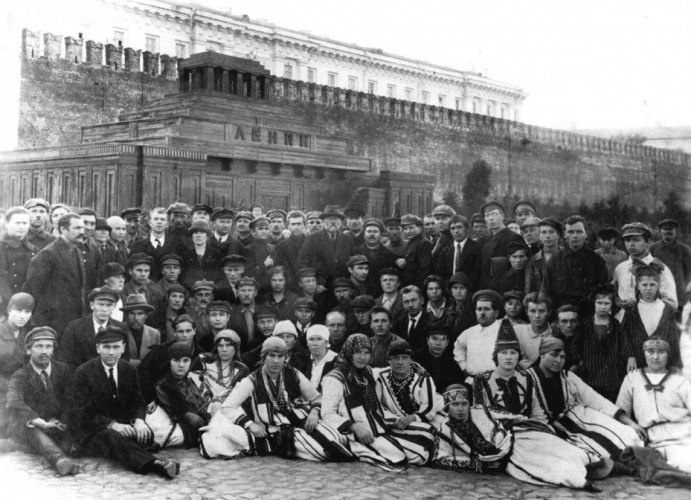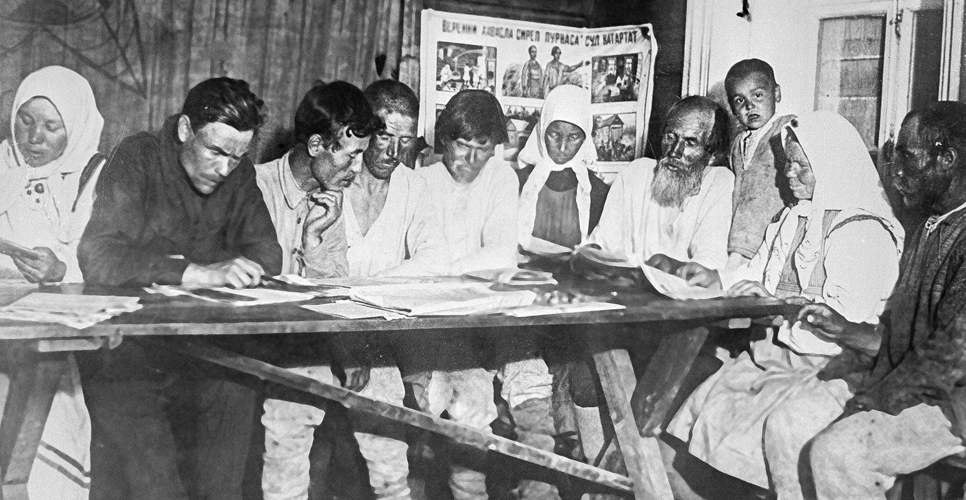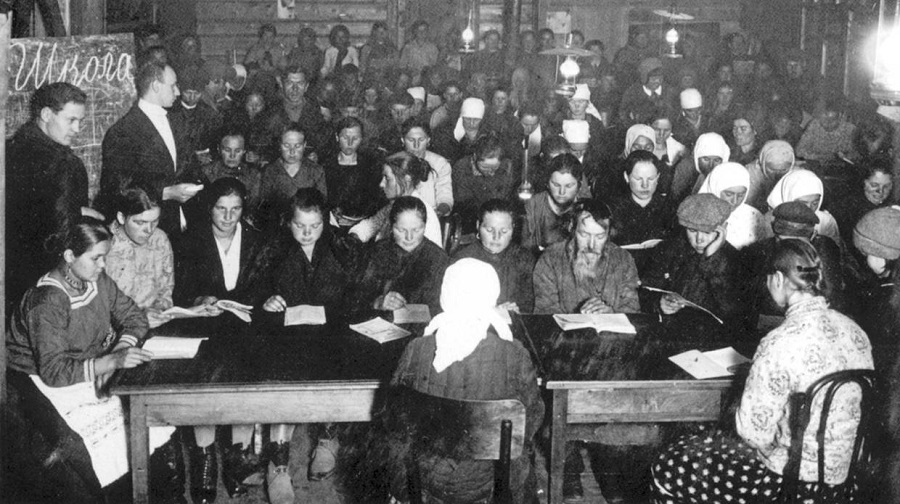The speech by Lenin at the All-Russian Conference for Organizations for Political Education delivered on November 5, 1920.
‘Political Education in Soviet Russia’ by Nikolai Lenin from Soviet Russia (New York). Vol. 4 No. 18. April 30, 1921.
Comrades! Permit me to impart a few thoughts to you that occurred to me in the Central Committee and in the Council of People’s Commissars in our discussion of the question of an organization of a central body for political education. Personally I take the liberty to remark that I have been opposed to an alteration of the name of your institution. What better name could be used than the designation “free culture,” which has now been replaced by the stilted Soviet designation, “Main Center for Political Education”? But as this question has already been decided, I beg of you to regard this observation as one that is personal only, and if the entire alteration is not to be limited to a change of name, if you are to succeed in attracting new members and to reestablish your activity in the field of education, it will be possible to adapt ourselves to the foible of the Soviet organs, to provide each thing and each authority with a special label, and in that case the new designation can perhaps even be welcome.
The most important point at present for the comrades engaged in the work of culture and education is that of the relation between education and our political aim. In bourgeois society it has always been, and still is maintained, that the spirit of knowledge is apolitical, or unpolitical. This is a piece of hypocrisy on the part of the bourgeoisie, nothing more or less than a refined method of deceiving the masses, 99 per cent of whom are oppressed by the domination of the church, of private property, etc. Under these circumstances, every “free” expression is directly or indirectly prejudiced by capital. Every state mechanism—and the larger the significance of this mechanism, the more is this dependence a fact—depends absolutely on capital and its policy. The connection between the bourgeois political parties and the educational system is in capitalist countries particularly firm and solid; but bourgeois society cannot openly admit this.
One of our chief tasks is that of opposing to bourgeois deception and hypocrisy our truth, and of obliging the bourgeoisie to recognize our truth.
The educational task must at present therefore be put in the foreground because it is urgently necessary to make the masses ripe for the Socialist order.
This is particularly important in Russia, where the urban proletariat constitutes a minority of the population. There could have been no possibility of a dictatorship of the proletariat, if the latter had not reached a high degree of consciousness, discipline, and fidelity in its struggle against the bourgeoisie. We do not take a utopian viewpoint, according to which the working masses per se are mature for the Socialistic society. We know through precise data taken from the entire history of the Socialism of the workers, that this is not the case, that maturity for Socialism is only attained through great industry, through struggle in strikes, through political organization. In order to carry the victory, in order to put through the Socialistic transformation, the proletariat must be capable of acting in solidarity to eliminate the exploiters, must be capable of playing the role of a pioneer. These class peculiarities and class abilities of the proletariat must be transformed into actual deed. For the comrades active in the field of education, this must be taken as one of the most important tasks. The Communist Party must here serve as a vanguard of the proletariat in the education and training of the working masses, must help them slough off the old habits, the old practices which we have received as an heirloom from the old regime, the practices and habits of private property, with which the great mass is still more or less permeated.
Main Center for Political Education
This fundamental task of the entire Socialistic transformation must never be lost sight of in the examination of specific questions. How the main center for political education is to be constructed, how it is to be united with the individual institutions, not only with the center but also with its own special divisions—these questions will be treated in your presence by comrades who are more competent in this field, who have already had great experience and engaged in the study of these things. I should like only to emphasize matters of principle.
We must treat this question frankly and in complete opposition to tradition, must combat the erroneous conception that education may under no circumstances be combined with politics. We are living in a historical period, in the period of struggle against the world bourgeoisie, which is still very much stronger than we are. In such a moment of struggle we must defend our Socialist work of construction and wage a conflict with this bourgeoisie, both in a military and—what is more important—in a spiritual sense, in the way of education.
It is necessary that the convictions, the ideas, that the working class has acquired in these decades, in the struggle for political freedom, that these habits, practices, may serve as weapons for the education of all the workers. The conviction must be imparted that it is not possible, that it is not permissible, to stand outside the struggle now being waged by the proletariat, which is embracing in increasing measure all the capitalist countries of the world without exception. The union of all great capitalist countries of the world against Russia, against Soviet Russia—this is the whole business of the present international political situation, and we must be entirely clear as to the fact that the fate of hundreds of millions of workers in the capitalist countries depends on this fact.
This shapes the situation—and we may say this quite openly—in such a way as to force us to take sides for one party or the other, for the dictatorship of the proletariat, or for the dictatorship of the bourgeoisie. It is possible only for either extremely ignorant people, who lack the necessary information, or for conscious betrayers, to stand aloof in this division.
In our country we experienced such a manifold shaping of events in the Kerensky period, among the Social Revolutionists and the Social Democrats, such a variegated color scheme in the various towns of Russia, that we may say that we have been tested more than any other people. If we look toward Western Europe we shall see that the same thing is now going on there that happened in our country. We are beholding a repetition of our own history. Almost everywhere you may see the Kerensky people by the side of the bourgeoisie. In a great number of states, particularly in Germany, they are at the head, and everywhere the same fact may be observed: the impossibility of assuming a middle position, and a clear understanding: either there will be a dictatorship of the Whites—the bourgeoisie in all the nations of Western Europe are preparing for this dictatorship and arming themselves against us—or a dictatorship of the proletariat. We have had to feel this so keenly and profoundly that I need not dwell on this in speaking to Russian Communists. But I draw only one inference, and one that must be laid at the basis of all the discussions and instructions connected with the Main Center for Political Education: we must openly recognize the predominance of the Communist Party in our policy.
The party may express the interests of its class more or less, may pass through alterations of one kind or another, but we do not yet know of a better form: no other form has as yet been found in any country. The entire struggle of Soviet Russia in the course of its three years’ resistance to the onslaught of world capitalism is based upon a realization of the task of supporting the proletariat, of executing its function as an educator, organizer, and leader, without which the downfall of capitalism is impossible.
Liberation from the Intellectuals
The working masses, the mass of peasants and workers, must free themselves from the tutelage of the intellectuals and educate themselves anew for the constructive activity of Communism, for it is otherwise impossible to approach this activity of construction. Our whole experience teaches that we are dealing with too serious a situation and the discussion of the activity of organizational reconstruction must begin with the recognition of the guiding function of the party. How this construction is to be realized—on this we shall have more to say later.
After the decree on the Main Center for Political Education shall have been published, you will see that it lacks a direct declaration of its attitude toward the party. The entire juristic and practical constitution of the Soviet Republic is built upon the fact that it is the party that is improving and determining everything, reconstructing everything according to a single principle, in order that the Communist elements in close contact with the proletariat may permeate it with their spirit and liberate it from the heritage of capitalism, which we are so ardently striving to overcome. The Commissariat for Public Education already has passed through a long struggle. Already for a long time the teachers’ organization has been fighting against the socialist transformation. In pedagogical circles the bourgeois prejudices have taken particularly firm root, and we are compelled to conquer our Communist position slowly, step by step. For the Main Center for Political Education, whose function it will be to spread information outside of the school, the decisive task of such instruction and enlightenment of the masses will be the necessity of putting in the foreground this leadership of the party, of subordinating this gigantic apparatus, this half million army of teachers, which is at present in the service of the workers, filling them with its spirit, fanning the flame of their initiative. The teaching staff, which grew up in bourgeois prejudices, was at the bottom of its heart hostile to the proletariat and had no contact with it. We must now raise a new army of pedagogical workers, which must be more closely connected with the party, more intimately acquainted with its ideals, more fully impressed with the spirit of these ideas. The teaching staff must itself attract the working masses, fill them with the Communist spirit, interest them in what the Communists are doing and win them over to the Communist standpoint.
The Nature of the Communist Leadership
In principle there cannot be any doubt for us that the leadership belongs to the Communist Party, that it is the aim of political education, of political culture, to educate true Communists, who shall be in a position to combat victoriously the lies and prejudices, and help the working masses in putting down the old order and carrying out the reconstruction of the state without capitalists and exploiters. How may this be done? It is only possible after we have gained all the knowledge that the teachers have received as a heritage from the bourgeoisie. All the technical achievements of Communism would be impossible without this, would be an empty illusion. The question now arises—how are those co-workers who are not accustomed to working in connection with a definite policy, in accordance with a policy necessary for us and particularly for Communism, to be adapted to this policy? This is a very difficult task, for which we have no ready-made solution.
We have taken up this question in the Central Committee of the party and made every effort to acquaint ourselves with all suggestions made in this field, and believe that the work of such conferences as yours will be of great importance in this connection.
We must now regard each propagandist, who formerly was considered only as a man belonging to a certain circle, to a certain organization, from an entirely different point of view. Every propagandist belongs to the party, which is guiding and directing the entire state, the world struggle of Soviet Russia against capitalism. This propagandist is a representative of the fighting class and party that controls and necessarily must control this mighty state apparatus. Many Communists, who were splendidly efficient in our former illegal work and who are tested and trusted workers either will not or cannot grasp the full significance of this time, the transition period, in which he who was an agitator and propagandist in the mass meeting must now become a leader of the gigantic national organization. If in this connection he should receive an inappropriate or misleading title, such as that of an “administrative official for public schools,” etc., the damage would not be great. It is important and necessary that he should be capable of guiding the masses of teachers.
Hundreds of thousands of teachers constitute an apparatus that must push our work forward. The fact that the masses of teachers are permeated with the heritage of capitalistic culture, must not and cannot prevent us from placing them in service of Communist education. The Communist active in the field of popular education must learn and understand to conduct this mass, which runs into hundreds of thousands.
This task is complicated, difficult, full of contradictions, but we can overcome it. We have already solved it in our Red Army. In this army tens of thousands of representatives of the old army were incorporated, and they adapted themselves to the army in a definite although rather extended process, fused themselves into a single unit with the army. Their victories are a proof of this. We must attain the same result in our work of culture and enlightenment. To be sure, this work does not appear so brilliant but it is not less important. Only after mastering this task, can we guide on the proper path the masses that capitalism had kept down and isolated from us. This is the goal that every agitator and propagandist must pursue in his work outside of the school. You must help Communism overcome in every way the resistance of the capitalists, not only the military and political resistance, but also their ideological resistance. The mightiest and most profound work is the mental transformation of the masses. Their eagerness for knowledge, their striving for education, for an understanding of Communism, which is apparent to us, afford us a guarantee that we shall be the victors here also, to be sure, not so quickly as at the front, and perhaps with greater difficulty and occasional defeats, but we shall nevertheless finally be the victors.
I should like to dwell on one point a little. Perhaps the designation: “Main Center for Political Education” is not properly understood as far as the use of the word “political” is concerned. Of course politics are here under discussion, but how are we to understand politics? If we think of politics in the bourgeois sense, we may fall into a grave error. Our politics are those of the proletariat struggling against the world bourgeoisie for its liberation. In our struggle two main factors are apparent. On the one hand there is the task of destroying, of annihilating the heritage received from the bourgeois regime, of suppressing the ceaselessly repeated attempts of the bourgeoisie to destroy the Soviet power. This task has hitherto taken up most of our attention and prevented us from going about the other task, that of reconstruction. Politics, as the bourgeoisie understands it, is to a certain extent detached from economics. The bourgeoisie said: “Workers, peasants, if you would attain the possibility of subsistence, work. Work, in order to buy in he market the things you need in order to live; the economic policy will be taken care of by your employers.”
But with us the case is different. Politics must be an affair of the entire people, the business of the proletariat. And let us here emphasize that we have hitherto been obliged to devote nine-tenths of our working time to the struggle against the bourgeoisie. The victories over Wrangel prove however that this on the conflict is approaching its end, that we have conquered peace with a number of countries, that every victory on the military front is liberating us for the internal struggle, for the reconstruction of the state. Every step that brings us nearer to a victory over the White Guards is a part of the gradual transfer of the center of gravity in this struggle to the field of economic policy.
Old and New Propaganda
The old style propaganda aimed to make clear what Socialism is. This old propaganda is at present of no use. We must now not describe but prove by practice how Socialism is to be constructed. Our whole propaganda must be based on the political experience of economic construction. This is our most important task. If anyone should grasp the situation in the old sense of the word, he would have to be regarded as backward and as not fitted for propaganda activity among the worker and peasant masses. Our main policy at present is directed at the economic reconstruction of the state; it has the object of gathering as much grain as possible, of distributing as much coal as possible, and of solving the problem of how this grain and this coal is to be used to the best purpose, in order to eliminate hunger. This is our policy. On this all our agitation and propaganda must be based. We must have fewer phrases, as phrases cannot fill the needs of the working population.
As far as the course of the war may afford us the possibility of transferring the center of gravity from the struggle against the bourgeoisie, against Wrangel, against the White Guards, to this new field, we shall devote our main attention to these economic questions. And it is in this matter that agitation and propaganda must play an increasingly enormous role. All tasks of agitation must be devoted to the practical reconstruction of national economy. Every agitator must be a national leader, must be a director of the peasants and workers in economic reconstruction. He must awaken in them the understanding that in order to be a Communist it is necessary to know the contents of a certain pamphlet, of a certain book, and to read such works attentively.
This is the way we shall take in order to elevate our economy, to make it more productive, to place it in a still higher measure in the service of the common good, to increase production, to shape the grain situation more favorably, to perfect the distribution of food, to raise the efficiency of coal mining and to reestablish industry without the capitalist spirit, all of which taken together constitute the essence of Communism. All our propaganda must be conducted in such a way that the result will be a practical control of the national structure. Communism must be easily accessible to the working masses, as it is a matter of life and death to them.
At present the matter is not yet being well formed; thousands of mistakes are being made. There is no reason for our concealing this.
It is not we, but it is the peasants and workers, who with our help, with our cooperation, with our slight and weak powers, must regulate and order the entire apparatus. For us, Communism has already ceased to be a program, a theory, a problem. For us it is an affair of actual constructive activity of today. Even when our enemies, in this war, inflicted the most cruel defeats upon us, we always learned something from them and ultimately reached victory. Now also we must learn from every defeat in the field of education, and improve our understanding accordingly. If from these examples, failures, mistakes, from our repeated misses, we gain knowledge for application in our constructive activity, we shall succeed in turning unfit Communist officials into true rebuilders, particularly of our economic life. We shall attain all that is needed, shall overcome all the obstacles placed in our way by the remnants of the old regime. We must reeducate the masses, which is possible only by propaganda and agitation. We must put the masses in direct contact with the reconstruction of the entire economic life. This must be the chief, the most important point in the activity of every agitator and propagandist; if he is clear in his own mind on this point the success of his activity is certain.
Soviet Russia began in the summer of 1919, published by the Bureau of Information of Soviet Russia and replaced The Weekly Bulletin of the Bureau of Information of Soviet Russia. In lieu of an Embassy the Russian Soviet Government Bureau was the official voice of the Soviets in the US. Soviet Russia was published as the official organ of the RSGB until February 1922 when Soviet Russia became to the official organ of The Friends of Soviet Russia, becoming Soviet Russia Pictorial in 1923. There is no better US-published source for information on the Soviet state at this time, and includes official statements, articles by prominent Bolsheviks, data on the Soviet economy, weekly reports on the wars for survival the Soviets were engaged in, as well as efforts to in the US to lift the blockade and begin trade with the emerging Soviet Union.
PDF of full issue: https://www.marxists.org/history/usa/pubs/srp/v4-5-soviet-russia%20Jan-Dec%201921.pdf
